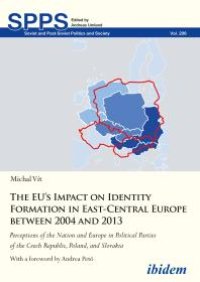
Ebook: The EU’s Impact on Identity Formation in East-Central Europe between 2004 and 2013 : Perceptions of the Nation and Europe in Political Parties of the Czech Republic, Poland, and Slovakia
Author: Michal Vit, Andrea Petö
- Tags: Political parties-Europe Eastern.
- Series: Soviet and Post-Soviet Politics and Society
- Year: 2019
- Publisher: Ibidem Verlag
- City: Berlin, GERMANY
- Language: English
- pdf
The Czech Republic, Poland, and Slovakia share similar experiences in the past, and a swift post-communist integration into the originally West European communities of democratic countries, as their “return to Europe.” Michal Vít explores how these three countries have been influenced by the new all-European environment for their independent national development. He introduces a research framework for the analysis of national identity focusing on parliamentary political parties represented at both the national and European levels. How did these parties cope with possible misfits of their understanding of national identity? How did these tensions interplay with their new transnational European political environment? Vít’s study finds that, after the accession of the Czech Republic, Poland, and Slovakia to the EU, there started a gradual decrease of identification of political parties with the European space. The extent of this estrangement was determined by these parties’ belonging or non-belonging to European political party families. The book provides a better understanding of current political developments in East-Central Europe and their consequences for these countries’ national and European politics. The Czech Republic, Poland, and Slovakia share similar experiences in the past, and a swift post-communist integration into the originally West European communities of democratic countries, as their “return to Europe.” Michal Vít explores how these three countries have been influenced by the new all-European environment for their independent national development. He introduces a research framework for the analysis of national identity focusing on parliamentary political parties represented at both the national and European levels. How did these parties cope with possible misfits of their understanding of national identity? How did these tensions interplay with their new transnational European political environment? Vít’s study finds that, after the accession of the Czech Republic, Poland, and Slovakia to the EU, there started a gradual decrease of identification of political parties with the European space. The extent of this estrangement was determined by these parties’ belonging or non-belonging to European political party families. The book provides a better understanding of current political developments in East-Central Europe and their consequences for these countries’ national and European politics. The Czech Republic, Poland, and Slovakia share similar experiences in the past, and a swift post-communist integration into the originally West European communities of democratic countries, as their “return to Europe.” Michal Vít explores how these three countries have been influenced by the new all-European environment for their independent national development. He introduces a research framework for the analysis of national identity focusing on parliamentary political parties represented at both the national and European levels. How did these parties cope with possible misfits of their understanding of national identity? How did these tensions interplay with their new transnational European political environment? Vít’s study finds that, after the accession of the Czech Republic, Poland, and Slovakia to the EU, there started a gradual decrease of identification of political parties with the European space. The extent of this estrangement was determined by these parties’ belonging or non-belonging to European political party families. The book provides a better understanding of current political developments in East-Central Europe and their consequences for these countries’ national and European politics. Biographische Informationen Dr Michal Vít studied political science in Brno, Magdeburg, Konstanz, and Vienna. Since 2017, he has been Assistant Professor of European Studies at the Metropolitan University of Prague and a Research Fellow at the EUROPEUM Institute for European Policy. Previously, he held fellowships at the Institute for European Policy in Berlin and the International Institute of Political Science at Masaryk University. Reihe Soviet and Post-Soviet Politics and Society - Band 206
Download the book The EU’s Impact on Identity Formation in East-Central Europe between 2004 and 2013 : Perceptions of the Nation and Europe in Political Parties of the Czech Republic, Poland, and Slovakia for free or read online
Continue reading on any device:

Last viewed books
Related books
{related-news}
Comments (0)